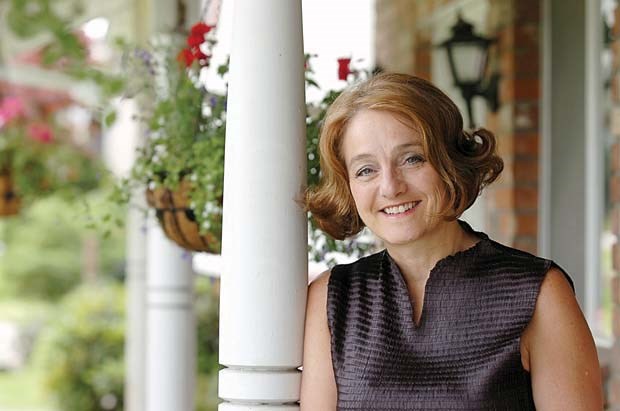Burnaby has won awards for being a well-managed city. It boasts four town centres that are set to become major activity hubs in the near future with the completion of large development projects and proposals - and the city's building permit values for this year alone are the envy of other Lower Mainland municipalities.
But Burnaby is still a large city with a variety of neighbourhoods that don't all conveniently fall within the core of the four hubs - and sometimes areas get lost between the cracks.
More than eight years ago, the Kingsway-Imperial neighbourhood was one area quickly becoming known as the "city dump."
That is until local resident Diane Gillis decided to take the neighbourhood back from the rising crime, prostitution and drugs.
"What I started noticing was scary stuff," Gillis said about what the area was like almost a decade ago. "We had shootings. I've been solicited way too many times, from men thinking I was a sex-trade worker.
"When I walked along Kingsway, I heard someone say the neighbourhood was gone."
Gillis's grandparents came in 1917 and ran a local drug store. She has lived in the area for 30 years and witnessed the neighbourhood's worsening behaviours.
"I do respect the fact that the city was thoughtful with its plan and it wasn't anybody being careless," she said. "It naturally evolved."
Gillis was tired of witnessing the crime and also being mistaken as a "Jane" by sex-trade workers, and decided to form the Kingsway Imperial Neighbourhood Association, which she is still president of.
"The thing about it is that what we have to do is get the message out that this isn't the city dump," she said. "There have been mattresses, tires, broken chests and drawers dumped here. There's been a fair bit of litter."
Gillis said she began to worry about the example the neighbourhood was setting to its youth living between Edmonds and Metrotown.
"It had a bad influence on our youth," she said. "It made the neighbourhood less walkable.
"We got kids growing up in a community and we're real believers in modeling behaviour."
Gillis took her cause to her neighbours, to join her new association, then to council, the police, the local MLA and the school board.
"I went to council and the police," she said. "I can attest to the fact that they listened to us. We don't get everything we want, but the area has vastly improved."
Portables were put in at the local com-munity school, and the addition of a youth worker gave the community an opportunity to grow. Another positive step forward was the proposed rezoning to the local motel.
"One thing that challenged me with creating a neighbourhood association was I wanted to meet in the community, but couldn't find a public space," she said.
The association has met everywhere from coffee shops to senior centres, but it didn't hinder progress.
One of the big challenges Gillis has personally tackled is the graffiti in the area, which she says if left alone would continue to send the wrong message.
"When you see graffiti it sends a message," she said. "It says, 'Come in here and do as you wish because it is against the law.'"
Gillis noted that the area has many 'mom and pop' businesses that were being plagued by unwanted spray paint.
"We want the businesses to be more successful," she said.
So reducing the visual crime has been tackled one mural at a time as Gillis is also a member of the Mayor's Task Force on Graffiti. One recent mural addition is part of an international series to promote healthy oceans.
Many of the area improvements also came from the local businesses re-investing into the community, Gillis said.
Sean Kumagai is the general manager at Metrotown Mazda at 5775 Kingsway. His office overlooks the Kingsway-Imperial intersection, which he says has afforded him the chance to really see the changes.
"About seven or eight years ago Diane approached me before our building was renovated, and she said she wanted to look at the area and make improvements," he said. "There were a lot of challenges to look at."
Kumagai noted the prostitution on the street corners, other suspicious people hanging around the neighbourhood and graffiti, which have all gone down considerably.
"Nobody probably sees more than what I see of what goes on," he said in his windowed office, facing the intersection. "If people care, things will continue to improve."
Kumagai said the association has enjoyed the full support of the city, local MLAs and the RCMP.
"There was a lot of interest in all of the politicians," he said. "We had community clean ups, and the graffiti task force really helped."
Another improvement to the area was local businesses renovating or upgrading their frontages.
"There have been a lot of big changes," he said. "Even us, we had a big renovation and now it looks nice. Visions is renovating right now and it was one of the last older buildings renovated here. One thing that makes the area better is the business investment. The changes represent that it's worthwhile to do business here."
Kumagai noted that the last few years have been very positive.
"It's at a really comfortable level now," he said about walking the neighbourhood streets.
Gillis said the changes speak to Burnaby's strength as a community, echoing Kumagai's comments that the area businesses were willing to improve the neighbourhood.
"There's a lot more conversation in the community," she said. "A renewed sense of hope."



